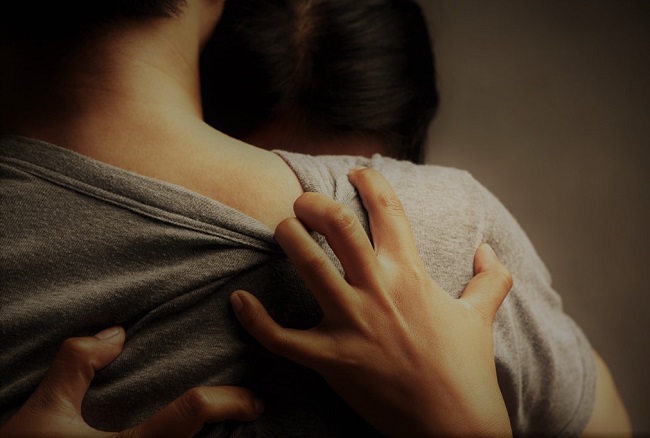“Bolts of electricity shoot around my abdomen and pelvis and down my leg as I lie on the pillow-topped hotel mattress, attempting in vain to remain silent. My husband’s arm, heavy from sleep, is draped over my aching body. I turn to look at him as he snores softly, blissfully unaware. No one told me the wedding night the night I dreamed about, would end with unbearable pain. Is this normal? Should it have felt like shards of glass stabbing me while moved inside me? I try not to let him hear me crying as I close my eyes and try to ignore the sharp electric-like currents terrorizing my body…
There is no one to speak to. I am the sole occupant of a vast and desolate island on which my innermost secrets cannot be shared, not even with my husband. Who to speak to? What to say? What to do when the event that should bring pulsating all-encompassing passion brings only excruciating pain instead? Who to tell when the one act that should create ecstasy and bliss causes pure agony? I should adore the sense of unity I feel with my husband when we are together, treasure each second that my body fuses with his. But, instead, all I feel is the white-hot sear of pain when he enters me, the blackness of despair when I know that I cannot share my pain with him and the blushing red of embarrassment when he knows I am not being honest…
How can I share the feelings of torture that overwhelm my body when he is inside of me? How can I let him know that he, my beloved husband, is the cause of my misery? How can I share with him that his body alone creates immense wretchedness in mine. I will never do that to him. I will never make him aware that he is the source of the agony that rocks my body through and through. Instead, I will live with this agonizing, heart-wrenching secret of mine. This secret that isolates me, that creates a fissure so large between me and my husband that I wonder if we will survive as one. And I will continue to allow my body to be exposed to the beatings and abuse that are, in reality, tender loving touch.”
Sound familiar anyone? Can you relate? Do you know what this girl means when she describes the pure agony that consumes her as she tries to have sex with her partner? Or the emotional turmoil she experiences as she tries to hide the pain from her partner? Well my friends, that girl is me, writing in my journal for the first year of my marriage.
You see, for many women with endometriosis, myself included, sex is not the erotic, passionate and pleasurable experience that we all wish it to be. In fact, according to a recent study in Italy, more than half of women with endometriosis experience dyspareunia, or genital pain associated with sex. Two types of dyspareunia exist. The first type, called superficial dyspareunia, is when the pain is felt at the opening of the vagina, and the lower part of the vagina. This pain is usually felt during the act of penetration and can easily be diminished by ceasing penetration. The second type, called deep dyspareunia, is felt deeper in the pelvis and thighs and can last for hours or even days. Women who have endometriosis, specifically recto-vaginal endometriosis and endometriosis on the cul-de-sac experience this type. There are many medical causes for dyspareunia other than endometriosis, such as vulvodynia, vulvar vestibulitis and interstitial cystitis. While this condition has historically been defined as a psychological issue, more recent treatment approaches lean towards the theory that dyspareunia is a combination of both physical and psychological causes. (More on dyspareunia theories).
In women with endometriosis, physical pain during sex is due to the presence of lesions found all over our insides, specifically behind the vagina and in the lower parts of the uterus. Having anything inside of us pushing or stretching those growths causes sheer agony, also described as burning, stabbing or deeply aching pain. It is intolerable, enough to make us scream, cry, or even throw up. This pain can start as early as the beginning of penetration and last up to 24-48 hours later. Women with endometriosis who have had a hysterectomy or who are going through hormonal treatments may experience pain due to vaginal dryness as well.
Dyspareunia has also been connected with more negative emotional attitudes towards sexuality as a whole. Studies have found that complaints of pain with sex are associated with low physical and emotional satisfaction, as well as decreased general happiness. Depression and anxiety were found more often in women with dyspareunia than control subjects.
Experiencing dyspareunia causes a loneliness inside of us that is worse than the most agonizing pain. Aside from simply not being able to connect sexually with people that we care about, we often feel compelled to hide our feelings from our loved ones so as not to hurt them. We would rather harm ourselves than tell our partners that they are hurting us. Keeping that a secret from them isolates us terribly, and fills us with a guilt that eats at our hearts. We are also consumed with incredibly strong guilt stemming from our inability to allow our partners the pleasure we know they deserve.
Fear of rejection is also a large part of the emotional pain associated with sex. We worry that our pain will cause our partners to reject us, whether because they have sexual needs that are lacking, or because they don’t want to cause us any harm. Ironically, many of us have experienced the strange situation in which we find ourselves begging our partners to have sex with us even though we know we will suffer. Aside from the pain experienced by those of us actually suffering with this disease, it is also important to mention the emotional anguish that our partners who don’t have endometriosis go through. They too have feelings of rejection when we refuse to have sex, and can sometimes feel insecure about the relationship. Unfortunately, their need to be loved and love another is sometimes inadvertently ignored.
Due to endometriosis-associated dyspareunia, sex is often a dreaded nightmare fraught with worry. We worry that we’ll have unbearable pain if we choose to have sex and that we will offend our partners if we choose not to have sex. We worry that when we do want to have sex our partners will refuse for fear of hurting us. Instead of bringing us closer to our partners, sex puts a strain on the relationship that is hard to overcome.
This post was published previously on Hormones Matter in January 2013.











